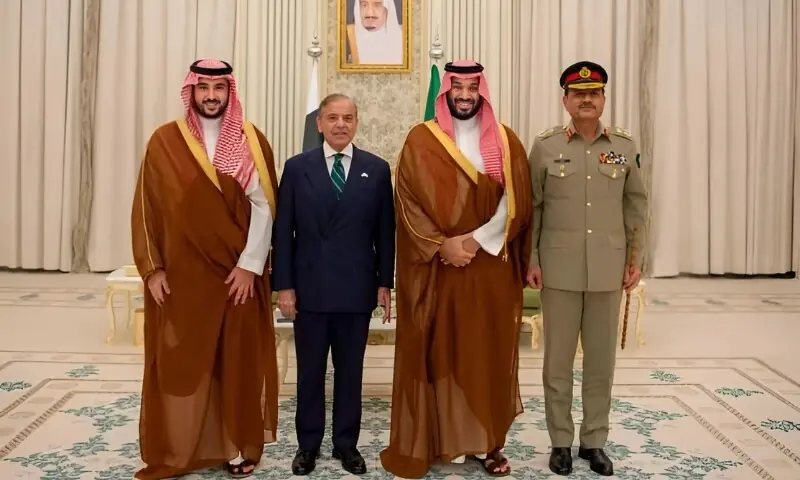Pakistan-Saudi Arabia defence pact set to redraw Gulf security map
A new era in the Gulf security has begun with the signing of a strategic mutual defence agreement between Saudi Arabia and Pakistan.
The agreement, signed during Prime Minister Shehbaz Sharif’s visit to Saudi Arabia, states that an attack on either country will be considered an attack on both, and that both nations will jointly respond to any threat.
The agreement followed a meeting between PM Shehbaz and Crown Prince Mohammed bin Salman, which focused on strengthening bilateral ties and reviewing key regional and international issues.
“This agreement, which reflects the shared commitment of both nations to enhance their security and to achieve security and peace in the region and the world, aims to develop aspects of defence cooperation between the two countries and strengthen joint deterrence against any aggression. The agreement states that any aggression against either country shall be considered an aggression against both,” a joint statement shared by the PM Office Media Wing said.
Under the agreement, Pakistan is now a partner in the protection of the Two Holy Mosques (Haramain Sharifain).
Its primary aim is to strengthen defence cooperation and ensure collective protection against any form of aggression.
United against aggression
Saudi Defence Minister Khalid bin Salman issued a statement following the signing of the defence agreement between Saudi Arabia and Pakistan.
In a post on the social media platform X (formerly Twitter), the Saudi defence minister said that Saudi Arabia and Pakistan will remain united forever against any aggressor.
He wrote that both brotherly nations are committed to the establishment of peace and security and will jointly confront all forms of aggression.
India studying implications
The defence agreement also drew a sharp response from India, which said it will study the pact’s implications for India’s national security.
India’s ministry of external affairs spokesman, Randhir Jaiswal said in a post on social media website X on Thursday that India was aware of the development, adding it would study its implications for New Delhi’s security and for regional stability.
Analysts believe that this defence pact could redraw the Gulf’s security landscape.
Following Israeli attacks on Qatar, many Arab nations have begun questioning the United States’ role as a reliable security guarantor, a position it had traditionally held in the region.
Shifting alliances
The agreement also signals shifting alliances and reflects waning Arab trust in US security guarantees, experts said.
Talking to Geo News, former ambassador Maleeha Lodhi also noted that the deal will have far-reaching implications, highlighting that Pakistan has now emerged as a security provider.
She added that Israel’s attack on Qatar triggered widespread concern and led Gulf governments to re-evaluate America’s reliability as a strategic ally.
Waning US credibility
The Israeli strikes on Doha, the former ambassador said, seriously damaged US credibility in the region and raised questions among Arab states about whether Washington could still be trusted.
Analysts also noted that the US failed to properly condemn Israel’s actions, which further prompted Gulf leaders to reconsider their defence strategies.
Former diplomats maintained that Gulf states are now actively exploring ways to guarantee their own security without relying solely on the US.
Referring to India’s growing ties with Gulf nations, experts said New Delhi was unaware of the Saudi-Pakistan agreement, which came as a strategic surprise.
Security analysts maintained that both Israel and India are likely to be alarmed by the emerging Pakistan-Saudi defence alliance.
For the latest news, follow us on Twitter @Aaj_Urdu. We are also on Facebook, Instagram and YouTube.
























Comments are closed on this story.